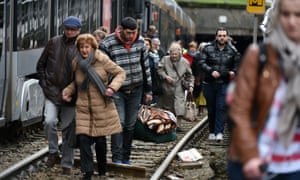
As she lay on the floor, just metres from the remains of a suicide bomber who had ripped apart her metro train, Samla da Rosa’s first instinct was to reach for human contact.
“We hugged each other. I hugged this young guy in front of me, and I was asking him, ‘Why? Why are they doing this?’” It was a question that would echo around the city for days.
Less than an hour earlier, when the day’s first two bombs devastated Brussels airport, Da Rosa called to check up on her husband. “I told him I am fine. I am having my breakfast and preparing to go to town on the metro, so don’t worry. Everything is fine.” She had ended up just one carriage away from another bomber, in a charred wreck where she would later hear that 20 people had died. To escape, when she and other survivors decided to risk getting up from the floor, they had to walk through scenes of hell. The explosion had burned away the skin and hair of those closest, and some people had lost all sense of where they were. “Other wounded people were like zombies, walking without direction,” she said, and body parts lay on the floor.
But when Da Rosa marked her birthday on Thursday, the only people she wanted to be with were the unknown men and women who had lived through the carnage, not her husband or friends she had got to know over 19 years inBelgium.
“I turned 54. I spent the whole day trying to find someone who was there with me,” she said, recalling a strange sense of closeness born of horror. “They say that you are born alone and you will die alone, but when you have an accident like that, I didn’t feel alone because the solidarity was so big.”
That sense of mutual aid was the opposite of what the men who tried to kill her wanted – to sow hatred and fear through death. They killed 31 people and injured 340 in blasts so devastating that many of the dead may not be formally identified for weeks.
Police were on the trail of the suspected bombers soon after they put out security camera footage of the men, pushing luggage trolleys through the airport. They were marked as suspicious partly because they were wearing gloves on only one hand, thought to have concealed their detonators.
A taxi driver called a tipoff line after he recognised a group of difficult clients from that morning, unusually edgy about handling their large suitcases. The unnamed driver may have averted an even greater tragedy, when he refused to take one piece of baggage because the car was overloaded.
A raid on the address he gave in the Schaerbeek district turned up 15kg of explosives, detonators and a suitcase filled with nails and screws, along with vital clues to the identity of at least two bombers – formally named the next day as petty criminals Ibrahim (known as Brahim) el-Bakraoui and his brother Khalid.
Other raids in the same street turned up a computer tossed in a rubbish bin with a confused statement from Ibrahim, one of the men who killed themselves at the airport. He described feeling “in a rush, not knowing what to do, being hunted everywhere, not being safe, and if this goes on, ending up in a cell”.
The desperate hunt for the bombers and their associates has exposed not just the men behind the bloodshed, but a string of basic, and tragic, intelligence failures that have led some to question whether Tuesday’s bloodshed could have been avoided.
No comments:
Post a Comment